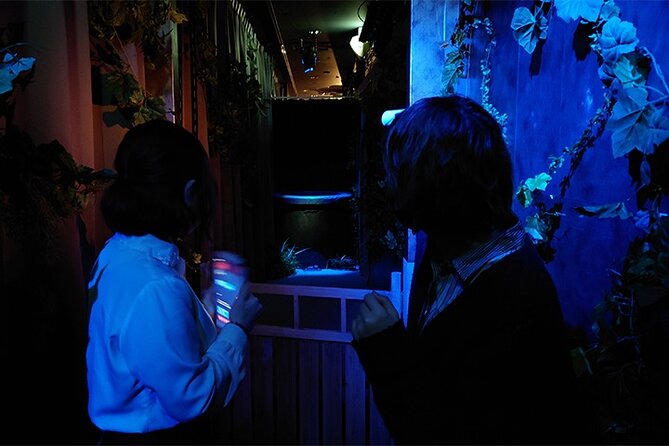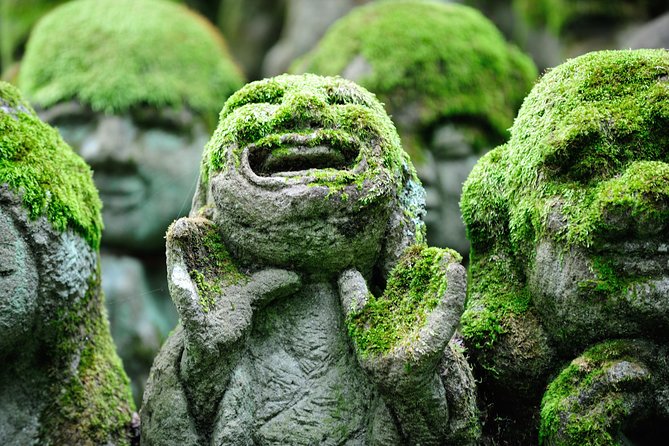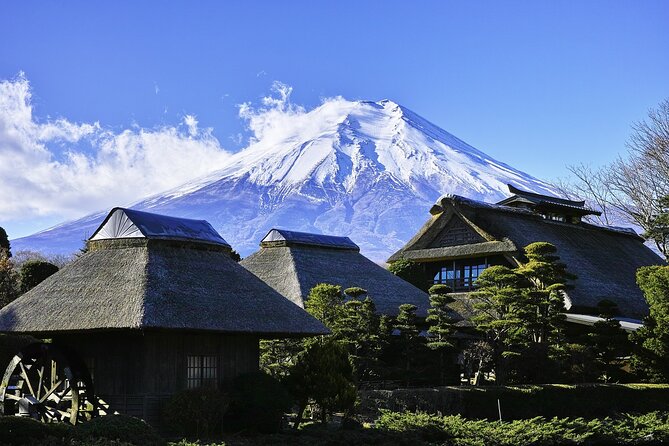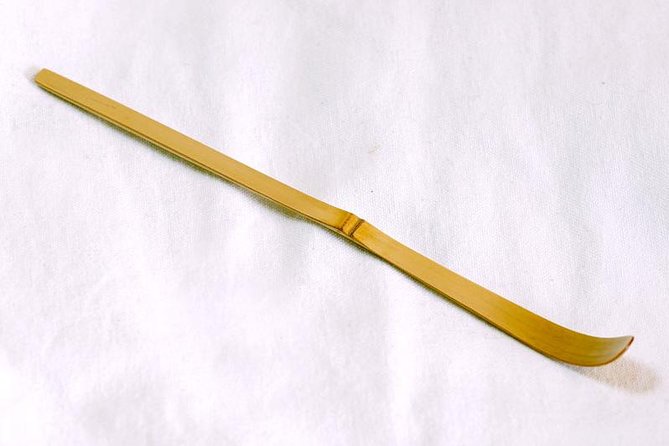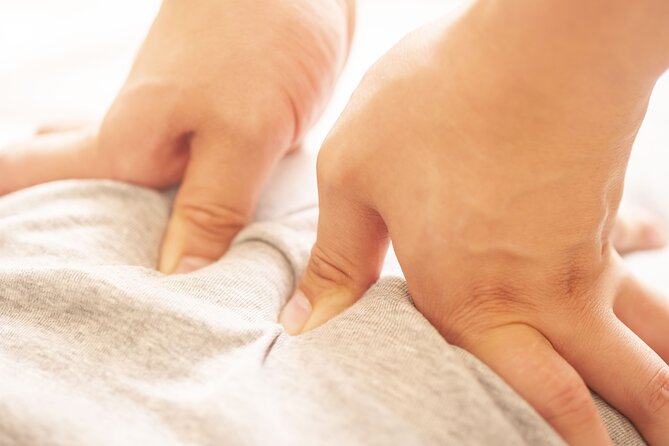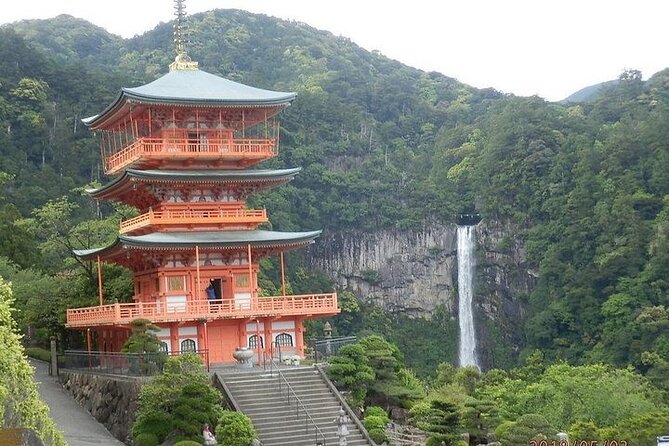They step into Kyoto’s serene tea landscape, where centuries of tradition and innovation blend seamlessly. On the Matcha Green Tea Tour, visitors embark on a journey through Uji’s lush plantations and historic tea houses, witnessing the art of Japanese tea-making perfected over generations. With traditional ceremonies, wagashi sweets, and matcha ice cream, the experience is as immersive as it is indulgent. But it’s just the beginning – what secrets lie behind the region’s commitment to quality and tradition?
Just The Basics
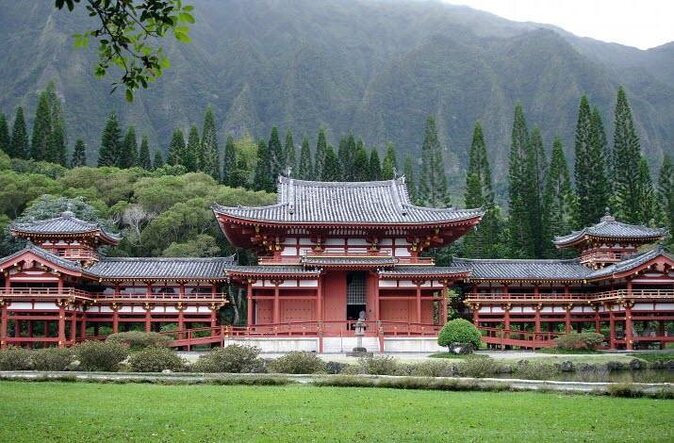
• Experience centuries-old tea traditions in Uji district, Kyoto, with lush green tea plantations and traditional tea houses.
• Enjoy a unique matcha experience with skilled artisans, traditional tea ceremonies, and indulgent wagashi sweets and matcha ice cream.
• Visit Byodoin Temple, a UNESCO World Heritage Site with stunning architecture, beautiful gardens, and tranquil ponds.
• Explore local tea shops in Uji, each with its own charm, such as Nakamura Tokichi and Ippodo Tea Co., offering high-quality Matcha powder and traditional tea sets.
• Immerse in Kyoto’s tea culture and traditions, with tea masters carefully crafting each cup, adhering to ancient practices and fostering a sense of community and mindfulness.
Discovering Uji’s Tea Heritage
In Japan’s renowned Uji district, centuries-old tea traditions come alive as visitors explore the rich heritage of Kyoto Matcha Green Tea.
This historic region, nestled in Kyoto, is famous for its lush green tea plantations and traditional tea houses.
As visitors explore the district, they’ll discover the art of Japanese tea-making, which has been perfected over generations.
Uji’s tea heritage is a testament to the region’s commitment to quality and tradition.
From the carefully cultivated tea leaves to the intricate tea ceremonies, every aspect of Uji’s tea culture is steeped in history and tradition.
Visitors will uncover the secrets of this ancient tradition as they wander through the picturesque tea plantations and enjoy the region’s vibrant tea culture.
Matcha Experience in Kyoto
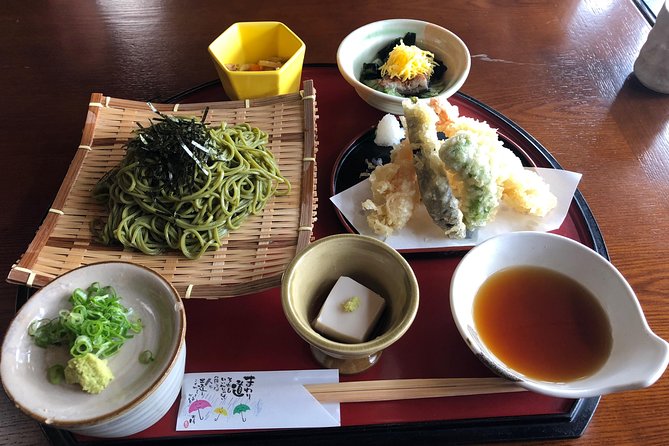
As visitors explore Uji’s tea heritage, they’ll discover that the true essence of Kyoto Matcha Green Tea lies in its unique matcha experience, where centuries-old traditions meet modern-day innovation.
From witnessing skilled artisans carefully craft matcha leaves to savoring the rich, vibrant flavors in a traditional tea ceremony, every moment is a sensory delight.
They’ll learn the art of matcha making, indulging in wagashi sweets and matcha ice cream along the way.
With a delicious set lunch and shopping time in the scenic Byodoin area, this immersive experience promises an unforgettable adventure in Kyoto’s green tea paradise.
Tea Culture and Traditions
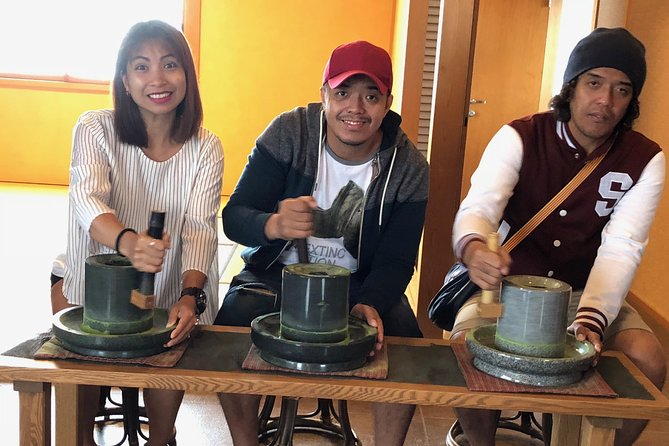
Kyoto’s tea culture is steeped in tradition, with centuries-old customs and rituals surrounding the revered green tea, Matcha.
The city’s tea masters carefully craft each cup, adhering to ancient practices that emphasize harmony, respect, and tranquility.
The traditional Japanese tea ceremony, also known as Chanoyu, Sado or Ocha, is a highly ritualized and choreographed event where Matcha is prepared and served to guests in a specially designed room.
This serene and intimate setting fosters a sense of community and mindfulness, allowing participants to connect with nature and each other.
As visitors explore Kyoto’s tea culture, they’ll discover the rich history and spiritual significance behind this beloved beverage.
Visiting Byodoin Temple
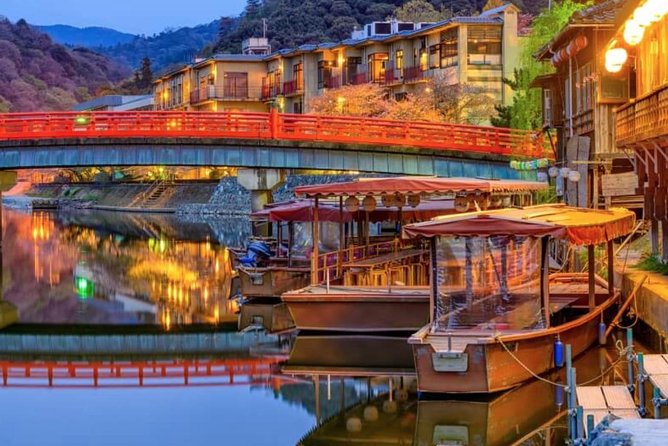
Byodoin Temple, a UNESCO World Heritage Site, awaits visitors with its stunning architecture and serene surroundings, promising an unforgettable experience amidst Japan’s rich cultural heritage.
This iconic temple is a must-visit attraction in Uji, Kyoto, and a perfect addition to the Matcha Green Tea Tour.
As visitors stroll through the temple’s grounds, they’ll be surrounded by beautiful gardens and tranquil ponds, providing a peaceful atmosphere to soak up the history and culture.
The temple’s main hall, Phoenix Hall, is particularly striking, with its intricate designs and vibrant colors.
With its unique blend of architecture, history, and natural beauty, Byodoin Temple is an unmissable stop on this adventure through Japan’s tea culture.
Exploring Local Tea Shops
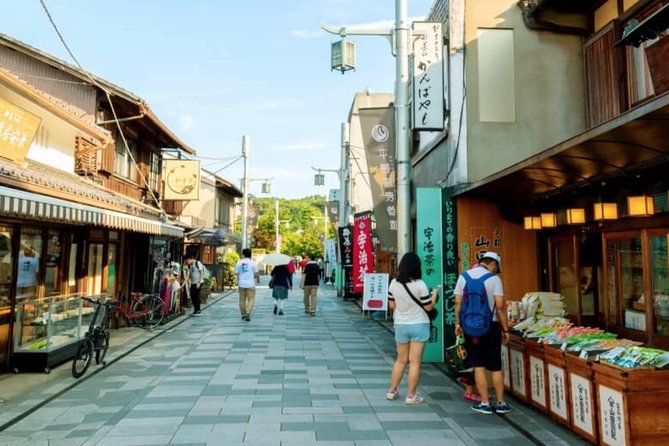
After seeing the serene atmosphere of Byodoin Temple, visitors can further indulge their senses by discovering Uji’s hidden gems: local tea shops that embody the region’s centuries-old tea-making traditions. These shops offer a unique opportunity to experience the rich flavors and aromas of Matcha, as well as learn about the art of traditional Japanese tea ceremonies. From boutique stores to family-owned businesses, each shop has its own unique charm and character.
| Tea Shop | Specialty | Address |
|---|---|---|
| Nakamura Tokichi | High-quality Matcha powder | 2-10, Uji, Kyoto |
| Ippodo Tea Co. | Traditional Japanese tea sets | 52, Uji, Kyoto |
| Marukyu-Koyamaen | Hand-picked Matcha leaves | 14-3, Uji, Kyoto |
| Taihōan | Rare Matcha varieties | 11-1, Uji, Kyoto |
| Camellia | Matcha-infused sweets | 35-1, Uji, Kyoto |
Savoring Matcha Delights
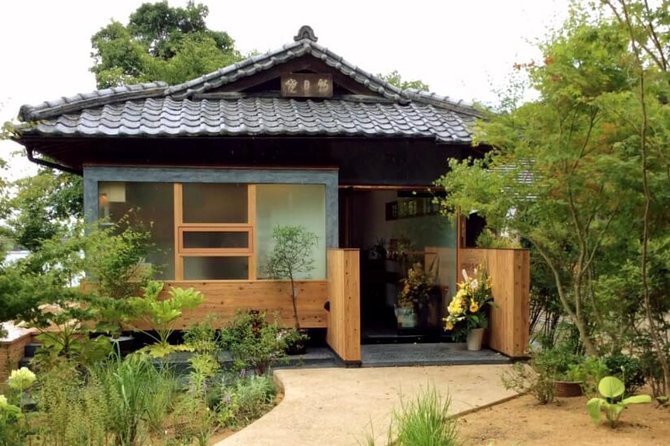
They indulge in a world of Matcha delights, from traditional Wagashi sweets to creamy Matcha ice cream, and discover the perfect harmony of flavors in Uji’s tea shops.
The sweetness of the Wagashi complements the bitterness of the Matcha, while the creamy texture of the ice cream provides a refreshing contrast.
They explore the various flavor profiles of Matcha, from subtle and delicate to bold and rich, and learn how to pair it with traditional Japanese sweets.
As they savor each bite, they develop a deeper appreciation for the art of Matcha-making and the rich cultural heritage of Japan’s tea traditions.
Behind the Scenes of Matcha
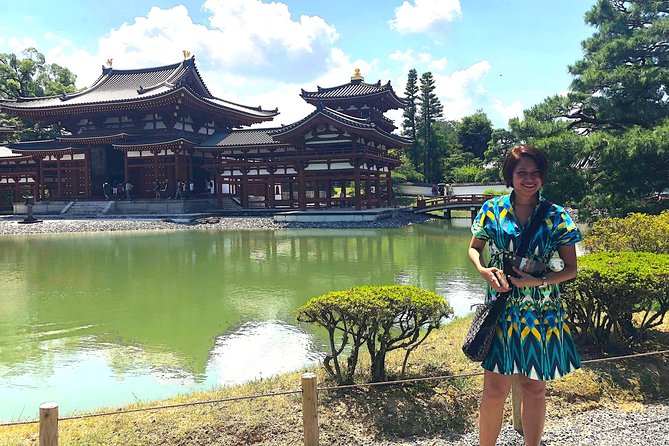
In the tranquil hills of Uji, local artisans meticulously craft Matcha, carefully hand-picking and drying the delicate tea leaves to bring out its vibrant green color and nuanced flavor profiles.
This labor-intensive process requires great skill and patience, as even the slightest variation in temperature or humidity can affect the final product.
Tea plants are shaded from sunlight for 20-30 days to increase chlorophyll and L-theanine content.
Leaves are hand-picked by skilled farmers to ensure only the youngest, most tender leaves are selected.
Steaming and drying processes are carefully monitored to prevent oxidation and preserve the tea’s natural flavor.
Artisans use traditional stone mills to grind the leaves into a fine, vibrant green powder.
The entire process, from cultivation to production, is carefully controlled to ensure the highest quality Matcha.
Tips for the Perfect Tour
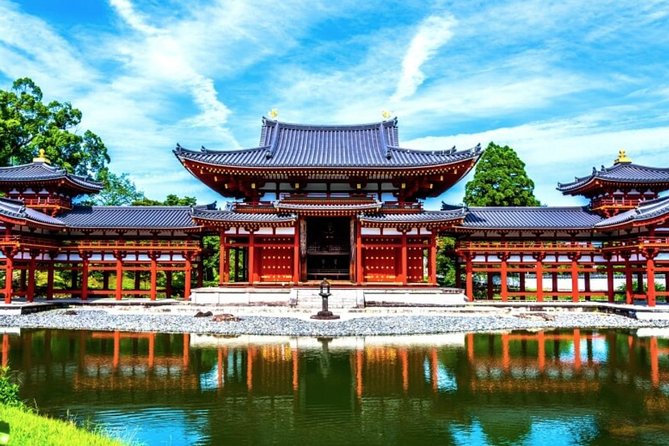
To maximize their experience, travelers should arrive at Uji Station with an empty stomach and a sense of curiosity, ready to explore the rich world of Kyoto Matcha Green Tea.
It’s essential to wear comfortable shoes, as the tour involves exploring local tea shops and the Byodoin Temple.
Don’t forget to bring sunscreen, a hat, and sunglasses to protect yourself from the sun.
Be prepared to ask questions and learn from the knowledgeable guides.
Take advantage of the shopping time to pick up unique souvenirs and teas to bring back home.
Lastly, be open-minded and ready to try new flavors and experiences – it’s all part of the adventure!
Frequently Asked Questions
Are Cameras Allowed During the Tea Experience and Temple Visit?
She wonders if cameras are allowed during the tea experience and temple visit. Fortunately, yes, they are, so she can capture the serene atmosphere and vibrant green tea fields, preserving memories of her unique adventure.
Can I Customize the Tour for a Larger Group Size?
She can’t customize the tour for a larger group size since it’s limited to 10 travelers; however, she can book multiple tours or contact the operator to discuss potential alternatives or private arrangements.
Are There Any Non-Matcha Tea Options Available for Tasting?
She wonders if non-matcha tea options are available for tasting. While matcha is the star, some tea shops might offer other Japanese green teas, like sencha or gyokuro, for a unique comparison of flavors and aromas.
Is the Lunch Menu Adaptable for Dietary Restrictions?
She checks the menu and finds that, unfortunately, the lunch options aren’t adaptable for vegans or gluten-free diets, but vegetarians will be pleased to know that they’re catered for, with some delicious options available.
Are There Any Souvenir Shops Near the Meeting Point?
She finds souvenir shops near Uji Station, offering traditional Japanese goods and local tea-themed items. After the tour, she can explore the shopping streets in the Byodoin area, perfect for picking up unique mementos.
Not for you? Here's more of our most recent tour reviews happening neaby
Final Words
As the Kyoto Matcha Green Tea Tour comes to a close, the lingering aroma of matcha and the warmth of traditional tea ceremonies stay with you.
With a deeper understanding of Uji’s tea heritage and the art of Japanese tea-making, you’re left with a sense of wonder and a newfound appreciation for this ancient tradition.

